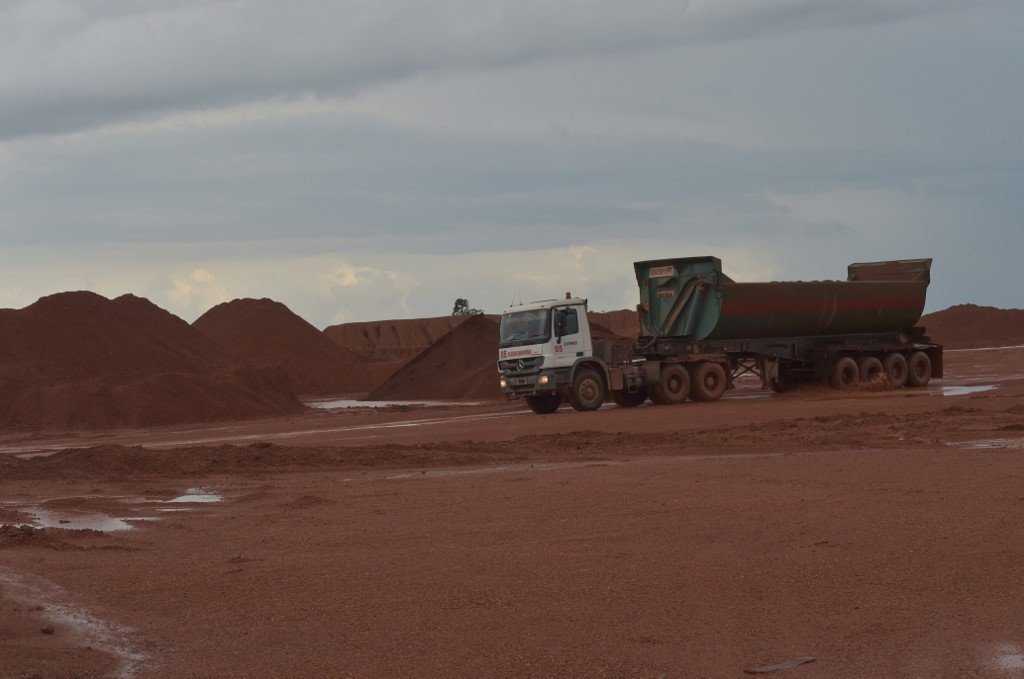Popular Reads
Top Results
Can't find what you're looking for?
View all search resultsPopular Reads
Top Results
Can't find what you're looking for?
View all search resultsBuild those smelters!
Bauxite is not as important an export commodity for Indonesia as CPO or coal, and the bauxite shipment ban will not roil global markets, because Indonesia's global market share is not that large.
Change text size
Gift Premium Articles
to Anyone
W
hen it comes to industry regulations, the government has a tendency for abrupt and poorly communicated changes, but it is also known for quickly undoing those changes in response to adverse responses. While businesses lament the former, they often take advantage of the latter.
Neither of those two hallmarks of Indonesian economic policymaking, however, has any bearing on the recently enforced bauxite export ban, because that had been announced long in advance, and there is relatively little pressure for it to be rescinded.
Indonesia’s drive to develop its downstream metal industries is one of the most widely promoted policies under President Joko “Jokowi” Widodo, and curbing mineral ore exports has been part and parcel of that drive from the outset, even before Jokowi’s first term in office.
In the case of bauxite, the industry was given three years’ notice with the issuance of the underlying law, and the President reaffirmed the plan in a statement last December.
Nobody can therefore claim to be surprised or shocked.
There were legitimate complaints when the downstream policy was first imposed on mining firms about a decade ago. It came out of left field, with severe terms and unrealistic timelines. However, the government soon softened both terms and timelines, while keeping up the rhetoric.
Nevertheless, the bauxite ban has prompted criticism from industry players, who say there is not enough domestic bauxite-processing capacity to absorb all the ore produced in the country.
Perhaps they had been hoping for one of the administration's signature last-minute policy reversals, and perhaps they still are.
After all, the government did revoke a sudden crude palm oil (CPO) export ban imposed in April 2022 after less than a month. A similarly unexpected coal export ban imposed earlier that year also did not last more than a month.
Also, remember that PT Freeport Indonesia and PT Amman Mineral Nusa Tenggara both secured exemptions allowing them to continue copper concentrate exports for another year despite a ban that also kicked in this month.
Bauxite, however, is not as important an export commodity for Indonesia as CPO or coal, and the bauxite shipment ban will not roil global markets, because Indonesia's global market share is not that large.
For that reason the policy is unlikely to upset other governments, unlike with the nickel ore export ban, which had seen the European Union push for, and win, a World Trade Organization (WTO) ruling against Indonesia.
The government has dug in its heels, with Jokowi reiterating on Sunday that Indonesia would fight for the bauxite ban should any other country, such as China as the main importer, drag us to the WTO.
Even in the nickel case, the WTO ruling had little impact, because the appeal lodged by Jakarta will buy Indonesia plenty of time. Besides, the WTO has become a rather toothless bystander as countries happily impose unilateral restrictions, sanctions and countersanctions on one another as they see fit.
It does not appear likely, therefore, that the government will budge in response to pressure, whether from within or from outside the country.
In the case of nickel, an ore export ban that was initially staunchly rejected eventually led to massive investment to move Indonesia up the commodities value chain. Years after the complaints and legal threats had died down, the government was vindicated by the downstream policy’s undeniable impact.
While the economics may differ, bauxite should eventually follow the same path. Four smelters are in operation, and work on eight more is reportedly ongoing. Now is the time to double down on those projects.
Business representatives have lobbied for a minimum price to control how much smelters must pay for bauxite, and that seems reasonable to prevent the processing firms from abusing their sudden gain in bargaining power as unprocessed ore piles up.
Also, demands for banks to make funds available on reasonable terms seem fair. But the message from the government is clear: Elections or not, it is time for mining industry investors to get with the program.











